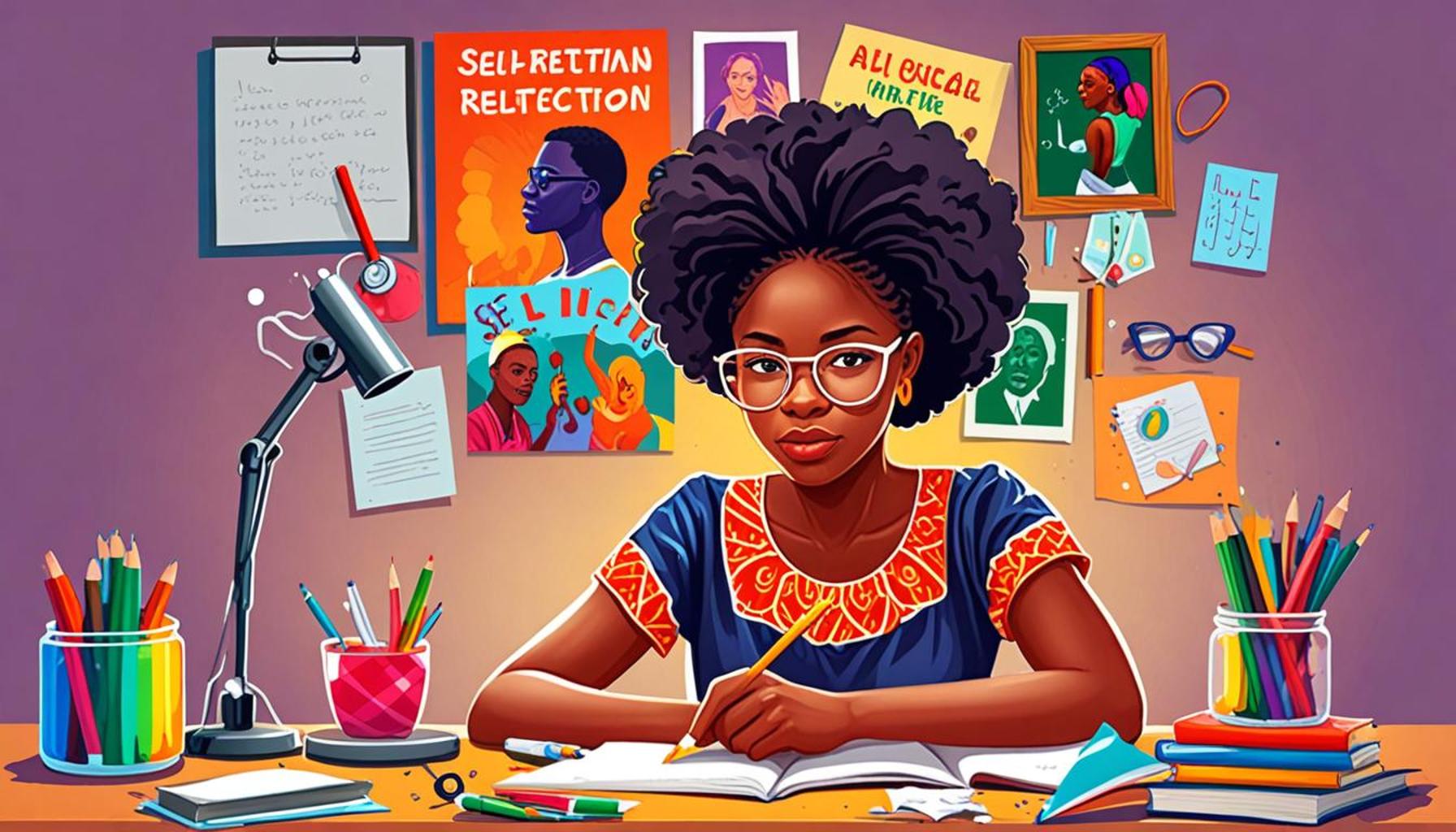Self-Reflection Practices to Enhance Motivation and Productivity in Nigerian Educators

The Importance of Self-Reflection for Educators in Nigeria
In an educational landscape as diverse and vibrant as Nigeria’s, the challenges that educators face can be both daunting and exhilarating. With a vast array of cultures, languages, and socioeconomic backgrounds, teachers must adapt their approaches to meet the needs of their students effectively. In this dynamic environment, self-reflection emerges as a powerful tool, providing teachers with the opportunity to assess their practices, motivations, and overall effectiveness. This practice not only fosters personal growth but also translates into enhanced productivity within the classroom.
Benefits of Self-Reflection
Engaging in self-reflection allows educators to:
- Identify strengths and weaknesses in their teaching methods.
- Set realistic goals for personal and professional development.
- Enhance emotional intelligence to better connect with students.
Through self-analysis, teachers can recognize effective strategies they employ in their classrooms while also pinpointing areas for improvement. For instance, a teacher may realize that their approach to classroom management is successful in engaging students during lessons but less effective during assessments. By identifying such nuances, they can develop targeted strategies to balance engagement across all aspects of teaching.
Managing Challenges in the Nigerian Educational System
In Nigeria, where educators often juggle multiple responsibilities amidst limited resources and large class sizes, self-reflection can be crucial. It provides a structured way to manage stress and combat feelings of burnout, which can severely impact motivation. In a country where teachers may face inadequate materials or insufficient pay, taking time to reflect can help renew their passion for education and loyalty to their students.
Moreover, educators who routinely engage in self-reflection are more likely to foster an engaging and productive learning environment. For instance, reflecting on student feedback, they may discover that certain teaching methods resonate more with their classes. By adjusting their pedagogical strategies accordingly, they not only enhance their effectiveness but also create a more inclusive atmosphere that allows all students to thrive.
Practical Self-Reflection Techniques
As we delve deeper into the realm of self-reflection practices, this article will uncover effective techniques tailored for Nigerian educators. Possible methods might include maintaining a reflective journal, where teachers can document their daily experiences, challenges, and triumphs. Another technique could involve peer observation, wherein educators can critique and learn from each other’s practices. Additionally, engaging in professional development workshops can provide new insights and strategies that can be incorporated into everyday teaching.
Ultimately, self-reflection not only benefits teachers but also directly impacts their students’ success. By embracing this practice, educators in Nigeria can cultivate an enriching educational environment that prepares their students for a rapidly changing world, thus laying a solid foundation for the future.
CHECK OUT: Click here to explore more
Exploring Effective Self-Reflection Techniques
To truly harness the power of self-reflection, Nigerian educators can adopt a variety of practical techniques designed to enhance their motivation and productivity. These practices are not just theoretical; they are actionable steps that can be integrated into the daily routines of teachers, regardless of their experience level or the challenges they face in the classroom.
1. Reflective Journaling
One of the most effective self-reflection practices is maintaining a reflective journal. This involves setting aside time each day or week to write about teaching experiences, emotional responses to classroom events, and interactions with students. By documenting these reflections, educators can identify recurring patterns and themes in their teaching. This process not only clarifies thought but also serves as a source of motivation as teachers celebrate their successes and articulate their aspirations.
- Document Classroom Interactions: Note specific instances where a teaching method worked well or not, and assign thoughts on why that may have been the case.
- Assess Emotional Responses: Reflect on feelings during various teaching experiences to understand how emotions influence engagement and classroom dynamics.
- Set Goals: Use insights gained from reflection to establish attainable goals for improvement, such as enhancing communication with students or trying new instructional strategies.
2. Peer Observation and Feedback
Engaging in peer observation can create a collaborative environment wherein educators learn from one another. By observing colleagues in their classrooms, teachers not only gain fresh perspectives but also receive constructive feedback on their own teaching practices. This technique fosters an atmosphere of continuous improvement, allowing educators to adapt best practices that resonate with their unique student populations.
Additionally, peer feedback sessions can transform the often isolated teaching experience into a supportive community. Educators can share successes and challenges, leading to shared problem-solving where practical solutions can be discussed. In Nigeria’s complex educational landscape, building a network of supportive peers can significantly alleviate feelings of isolation, further boosting motivation and productivity.
3. Professional Development Workshops
Another avenue for self-reflection is participation in professional development workshops. These workshops often highlight innovative teaching methodologies, classroom management strategies, and current educational research. By attending these sessions, educators are exposed to fresh ideas that can reinvigorate their teaching practice. More importantly, they have the opportunity to reflect on how new techniques might be applicable to their unique classroom circumstances.
Incorporating workshops into professional development not only aids in personal growth but also aligns educators with the latest trends in education, ensuring that they remain relevant and effective in an ever-evolving educational landscape. The exchange of ideas during these sessions often sparks a renewed passion for teaching, making them a vital component of self-reflection.
By actively engaging in these self-reflection practices, Nigerian educators can create a sustainable path to enhancing their motivation and productivity. These steps encourage a mindset of continuous improvement and adaptation, crucial for thriving in Nigeria’s diverse and often challenging educational environment.
| Category | Benefits and Key Features |
|---|---|
| Increased Self-Awareness | Understanding personal triggers that affect teaching style, which allows for more effective interactions with students. |
| Enhanced Goal Setting | SMART goals help educators focus their efforts, making it easier to track progress and maintain motivation. |
| Improved Emotional Regulation | Mindfulness techniques help manage stress, leading to a more productive educational environment. |
Self-reflection practices create pathways for educators in Nigeria to not only enhance their productivity but also to cultivate a profound sense of motivation. Through increased self-awareness, educators can discern their unique teaching styles and identify which aspects resonate most with their students. This understanding can significantly influence their engagement strategies, thereby fostering a vibrant learning atmosphere.Moreover, the practice of establishing SMART goals can serve as a pivotal factor in achieving educational objectives. When educators devise specific, measurable, achievable, relevant, and time-bound goals, they can provide clear direction for their day-to-day activities. This structured approach not only propels their personal growth but also contributes to a more organized and productive education system.Lastly, incorporating emotional regulation strategies, such as mindfulness techniques, can greatly assist Nigerian educators in managing the pressures associated with teaching. These practices not only mitigate stress but also enhance the overall mood of educators, paving the way for more focused and motivated teaching experiences. As the quest for educational excellence continues, self-reflection stands out as a vital component for fostering motivation and productivity among educators.
CHECK OUT: Click here to explore more
Building a Culture of Self-Reflection
To further enhance the effectiveness of self-reflection practices, Nigerian educators should consider integrating these strategies into a broader culture of reflection within their schools. By fostering an environment where reflection is not only encouraged but celebrated, educators can support one another in the pursuit of growth and excellence. Here are additional methods to create a thriving reflective culture among educators.
4. Collaborative Reflection Circles
Organizing collaborative reflection circles serves as a powerful tool for collective self-reflection. In these circles, educators gather regularly to discuss their teaching experiences, share insights, and provide mutual support. This inclusive approach fosters open dialogue, where educators can express their thoughts candidly without fear of judgment.
The diversity of perspectives in these circles can lead to innovative solutions to common challenges faced in Nigerian classrooms. Through guided discussions, teachers can gain different viewpoints that may lead to breakthroughs in their practice. For instance, a teacher struggling with classroom management might find inspiration in a colleague’s successful behavior management strategy, igniting both motivation and productivity.
5. Self-Assessment Tools
Nigerian educators can also leverage self-assessment tools that prompt critical thinking about their teaching and professional development. Tools such as reflective rubrics, questionnaires, and skills assessments can provide educators with a framework for evaluating their effectiveness and areas for improvement. These self-assessment techniques encourage a deeper understanding of personal teaching styles and highlight specific skills that may need enhancement.
For example, educators can assess their ability to integrate technology in the classroom, rating their proficiency and identifying ways to enhance this skill. Recognizing these gaps not only motivates teachers to seek resources or training but, most crucially, aligns them with an actionable plan for continual improvement.
6. Mindfulness Practices
Incorporating mindfulness practices into daily routines is another effective self-reflection strategy. Mindfulness encourages educators to pause, breathe, and reflect on their thoughts and emotions without judgment. Simple exercises, such as meditation or deep-breathing exercises, can be done before classes or during breaks to recharge mentally and emotionally.
Studies have shown that mindfulness practices significantly enhance focus, reduce stress, and improve emotional regulation. By incorporating mindfulness into their day, educators in Nigeria can enhance their productivity and create a calming classroom environment, which in turn boosts student engagement. As a result, teachers can approach challenges with a clearer mindset and improved morale.
7. Action Research Projects
Embarking on action research projects offers educators an opportunity not only to reflect on their teaching practices but also to implement changes based on their findings. This cycle of action and reflection enables educators to test out new teaching strategies, assess their effectiveness, and refine their engagement with students based on real-time feedback and data.
For instance, a teacher could initiate a project aimed at increasing student participation through interactive learning techniques. By systematically documenting the outcomes and analyzing which approaches were effective, the educator not only promotes self-reflection but also contributes valuable insights to the educational community. Such initiatives highlight the importance of evidence-based practices and reinforce the educator’s identity as both a teacher and a learner.
Through these additional self-reflection practices, educators in Nigeria can cultivate an environment ripe for personal growth and sustained motivation. By sharing insights, assessing themselves authentically, incorporating mindfulness, and engaging in action research, the potential for enhanced productivity becomes limitless. The journey of self-reflection thus metamorphoses into a collective endeavor that enlivens the educational experience for both teachers and students alike.
ADDITIONAL INSIGHTS: Expand your understanding here
Conclusion
In closing, the profound impact of self-reflection practices on the motivation and productivity of Nigerian educators cannot be overstated. Embracing methods such as collaborative reflection circles, self-assessment tools, mindfulness practices, and action research projects cultivates an enriching environment for both personal and professional growth. These practices not only enhance the teaching experience but also establish a supportive community where educators can thrive together.
It becomes crucial for schools in Nigeria to adopt a culture that reveres reflection as a pathway to excellence, thereby paving the way for innovative problem-solving and shared learning. As educators engage in regular self-reflection, they unveil insights that guide them towards enhancing their instructional approaches, leading to improved student outcomes.
Moreover, the integration of mindfulness into daily routines signifies a pivotal step in nurturing mental well-being, enabling educators to face challenges with resilience and clarity. By consistently reflecting on their experiences, Nigerian educators can create dynamic classrooms that inspire and motivate not only themselves but also their students.
Ultimately, the journey of self-reflection transforms education into a collaborative adventure that drives continuous improvement. As educators harness the power of reflection, they stand to reshape the narrative of teaching in Nigeria, breathing life into the profession and fulfilling their vital role in shaping the minds of future generations.


